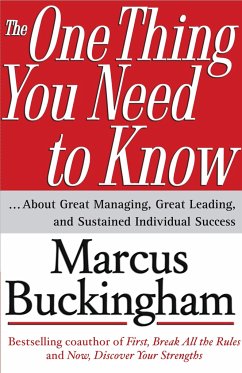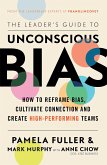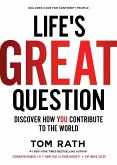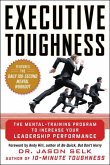Marcus Buckingham
The One Thing You Need to Know
... about Great Managing, Great Leading, and Sustained Individual Success
Marcus Buckingham
The One Thing You Need to Know
... about Great Managing, Great Leading, and Sustained Individual Success
- Gebundenes Buch
- Merkliste
- Auf die Merkliste
- Bewerten Bewerten
- Teilen
- Produkt teilen
- Produkterinnerung
- Produkterinnerung
Drawing on a wide body of research, both his own and that of others, the book reveals the central insights that lie at the core of great managing, great leadership and great careers.
Andere Kunden interessierten sich auch für
![The Leader's Guide to Unconscious Bias The Leader's Guide to Unconscious Bias]() Pamela FullerThe Leader's Guide to Unconscious Bias18,99 €
Pamela FullerThe Leader's Guide to Unconscious Bias18,99 €![What Got You Here Won't Get You There What Got You Here Won't Get You There]() Marshall GoldsmithWhat Got You Here Won't Get You There10,99 €
Marshall GoldsmithWhat Got You Here Won't Get You There10,99 €![The Virgin Way The Virgin Way]() Richard BransonThe Virgin Way13,99 €
Richard BransonThe Virgin Way13,99 €![Outstanding in the Middle Outstanding in the Middle]() Birgitta SjostrandOutstanding in the Middle18,99 €
Birgitta SjostrandOutstanding in the Middle18,99 €![The Leadership Constant The Leadership Constant]() Judy MorleyThe Leadership Constant19,99 €
Judy MorleyThe Leadership Constant19,99 €![Life's Great Question: Discover How You Contribute to the World Life's Great Question: Discover How You Contribute to the World]() Tom RathLife's Great Question: Discover How You Contribute to the World21,99 €
Tom RathLife's Great Question: Discover How You Contribute to the World21,99 €![Executive Toughness: The Mental-Training Program to Increase Your Leadership Performance Executive Toughness: The Mental-Training Program to Increase Your Leadership Performance]() Jason SelkExecutive Toughness: The Mental-Training Program to Increase Your Leadership Performance31,99 €
Jason SelkExecutive Toughness: The Mental-Training Program to Increase Your Leadership Performance31,99 €-
-
-
Drawing on a wide body of research, both his own and that of others, the book reveals the central insights that lie at the core of great managing, great leadership and great careers.
Hinweis: Dieser Artikel kann nur an eine deutsche Lieferadresse ausgeliefert werden.
Hinweis: Dieser Artikel kann nur an eine deutsche Lieferadresse ausgeliefert werden.
Produktdetails
- Produktdetails
- Verlag: Simon & Schuster Ltd
- Seitenzahl: 304
- Erscheinungstermin: 7. März 2005
- Englisch
- Abmessung: 235mm x 160mm x 26mm
- Gewicht: 542g
- ISBN-13: 9780743261654
- ISBN-10: 0743261658
- Artikelnr.: 21704139
- Herstellerkennzeichnung
- Libri GmbH
- Europaallee 1
- 36244 Bad Hersfeld
- gpsr@libri.de
- Verlag: Simon & Schuster Ltd
- Seitenzahl: 304
- Erscheinungstermin: 7. März 2005
- Englisch
- Abmessung: 235mm x 160mm x 26mm
- Gewicht: 542g
- ISBN-13: 9780743261654
- ISBN-10: 0743261658
- Artikelnr.: 21704139
- Herstellerkennzeichnung
- Libri GmbH
- Europaallee 1
- 36244 Bad Hersfeld
- gpsr@libri.de
Marcus Buckingham spent seventeen years at the Gallup Organization, where he conducted research into the world's best leaders, managers, and workplaces. The Gallup research later became the basis for the bestselling books First, Break All the Rules: What the World's Best Managers Do Differently (Simon & Schuster) and Now, Discover Your Strengths (Free Press), both coauthored by Buckingham. Buckingham has been the subject of in-depth profiles in The New York Times, Fortune, BusinessWeek and Fast Company. He now has his own company, providing strengths-based consulting, training, and e-learning. In 2007 Buckingham founded TMBC to create strengths-based management training solutions for organizations worldwide, and he spreads the strengths message in keynote addresses to over 250,000 people around the globe each year. He lives in Los Angeles with his wife Jane and children Jackson and Lilia. For more information visit: marcusbuckingham.com
Contents
1: A Few Things You Should Know About the "One Thing"
"Get me to the core": "If you dig into a subject deeply enough, what do you
find?"
A lifetime of "why"s: "What drove this book?"
The tests for the "one thing": "Why are some explanations more powerful
than others?"
One controlling insight: "What is the One Thing you need to know about
happy marriage?"
Part I
The One Thing You Need to Know
Sustained Organizational Success
2: Managing and Leading: What's the Difference?
A vital distinction: "Are they different? Are they both important? Can you
do both?"
A view from the middle: "What do great managers actually do and what
talents do you need to do it?"
A view from the top: "What do great leaders actually do and what talents do
you need to do it?"
3: The One Thing You Need to Know: Great Managing
The basics of good managing: "What skills will prevent you from failing as
a manager?"
Great managers play chess: "What is the One Thing you need to know about
great managing?"
A walk through a walgreens: "How does one truly great manager do it?"
Great managers are romantics: "What are the benefits of individualization?"
The three levers: "What are the three things you need to know about a
person in order to manage him or her effectively?"
The most useful questions: "How can you identify these levers?"
4: The One Thing You Need to Know: Great Leading
A leader wins our loyalty: "What did Giuliani say to calm our fears?"
Five fears, five needs, one focus: "What are the universals of human
nature?"
The points of clarity: "Where are your followers crying out for clarity?"
The disciplines of leadership: "How do the best leaders achieve this
clarity?"
Part II: The One Thing You Need to Know
Sustained Individual Success
5: The Twenty Percenters
Dave, Myrtle, and Tim: "What does sustained individual success look like?"
The early contenders: "What explanations seem like the One Thing, but
aren't?"
What is sustained success?: "It's a broad term. How do we define it?"
6: The Three Main Contenders
Contender 1: "Find the right tactics and employ them."
Contender 2: "Find your flaws and fix them."
Contender 3: "Discover your strengths and cultivate them."
7: So, How Do You Sustain Success If...?
You're bored
You're unfulfilled
You're frustrated
You're drained
Conclusion: Intentional Imbalance
Acknowledgments
1: A Few Things You Should Know About the "One Thing"
"Get me to the core": "If you dig into a subject deeply enough, what do you
find?"
A lifetime of "why"s: "What drove this book?"
The tests for the "one thing": "Why are some explanations more powerful
than others?"
One controlling insight: "What is the One Thing you need to know about
happy marriage?"
Part I
The One Thing You Need to Know
Sustained Organizational Success
2: Managing and Leading: What's the Difference?
A vital distinction: "Are they different? Are they both important? Can you
do both?"
A view from the middle: "What do great managers actually do and what
talents do you need to do it?"
A view from the top: "What do great leaders actually do and what talents do
you need to do it?"
3: The One Thing You Need to Know: Great Managing
The basics of good managing: "What skills will prevent you from failing as
a manager?"
Great managers play chess: "What is the One Thing you need to know about
great managing?"
A walk through a walgreens: "How does one truly great manager do it?"
Great managers are romantics: "What are the benefits of individualization?"
The three levers: "What are the three things you need to know about a
person in order to manage him or her effectively?"
The most useful questions: "How can you identify these levers?"
4: The One Thing You Need to Know: Great Leading
A leader wins our loyalty: "What did Giuliani say to calm our fears?"
Five fears, five needs, one focus: "What are the universals of human
nature?"
The points of clarity: "Where are your followers crying out for clarity?"
The disciplines of leadership: "How do the best leaders achieve this
clarity?"
Part II: The One Thing You Need to Know
Sustained Individual Success
5: The Twenty Percenters
Dave, Myrtle, and Tim: "What does sustained individual success look like?"
The early contenders: "What explanations seem like the One Thing, but
aren't?"
What is sustained success?: "It's a broad term. How do we define it?"
6: The Three Main Contenders
Contender 1: "Find the right tactics and employ them."
Contender 2: "Find your flaws and fix them."
Contender 3: "Discover your strengths and cultivate them."
7: So, How Do You Sustain Success If...?
You're bored
You're unfulfilled
You're frustrated
You're drained
Conclusion: Intentional Imbalance
Acknowledgments
Contents
1: A Few Things You Should Know About the "One Thing"
"Get me to the core": "If you dig into a subject deeply enough, what do you
find?"
A lifetime of "why"s: "What drove this book?"
The tests for the "one thing": "Why are some explanations more powerful
than others?"
One controlling insight: "What is the One Thing you need to know about
happy marriage?"
Part I
The One Thing You Need to Know
Sustained Organizational Success
2: Managing and Leading: What's the Difference?
A vital distinction: "Are they different? Are they both important? Can you
do both?"
A view from the middle: "What do great managers actually do and what
talents do you need to do it?"
A view from the top: "What do great leaders actually do and what talents do
you need to do it?"
3: The One Thing You Need to Know: Great Managing
The basics of good managing: "What skills will prevent you from failing as
a manager?"
Great managers play chess: "What is the One Thing you need to know about
great managing?"
A walk through a walgreens: "How does one truly great manager do it?"
Great managers are romantics: "What are the benefits of individualization?"
The three levers: "What are the three things you need to know about a
person in order to manage him or her effectively?"
The most useful questions: "How can you identify these levers?"
4: The One Thing You Need to Know: Great Leading
A leader wins our loyalty: "What did Giuliani say to calm our fears?"
Five fears, five needs, one focus: "What are the universals of human
nature?"
The points of clarity: "Where are your followers crying out for clarity?"
The disciplines of leadership: "How do the best leaders achieve this
clarity?"
Part II: The One Thing You Need to Know
Sustained Individual Success
5: The Twenty Percenters
Dave, Myrtle, and Tim: "What does sustained individual success look like?"
The early contenders: "What explanations seem like the One Thing, but
aren't?"
What is sustained success?: "It's a broad term. How do we define it?"
6: The Three Main Contenders
Contender 1: "Find the right tactics and employ them."
Contender 2: "Find your flaws and fix them."
Contender 3: "Discover your strengths and cultivate them."
7: So, How Do You Sustain Success If...?
You're bored
You're unfulfilled
You're frustrated
You're drained
Conclusion: Intentional Imbalance
Acknowledgments
1: A Few Things You Should Know About the "One Thing"
"Get me to the core": "If you dig into a subject deeply enough, what do you
find?"
A lifetime of "why"s: "What drove this book?"
The tests for the "one thing": "Why are some explanations more powerful
than others?"
One controlling insight: "What is the One Thing you need to know about
happy marriage?"
Part I
The One Thing You Need to Know
Sustained Organizational Success
2: Managing and Leading: What's the Difference?
A vital distinction: "Are they different? Are they both important? Can you
do both?"
A view from the middle: "What do great managers actually do and what
talents do you need to do it?"
A view from the top: "What do great leaders actually do and what talents do
you need to do it?"
3: The One Thing You Need to Know: Great Managing
The basics of good managing: "What skills will prevent you from failing as
a manager?"
Great managers play chess: "What is the One Thing you need to know about
great managing?"
A walk through a walgreens: "How does one truly great manager do it?"
Great managers are romantics: "What are the benefits of individualization?"
The three levers: "What are the three things you need to know about a
person in order to manage him or her effectively?"
The most useful questions: "How can you identify these levers?"
4: The One Thing You Need to Know: Great Leading
A leader wins our loyalty: "What did Giuliani say to calm our fears?"
Five fears, five needs, one focus: "What are the universals of human
nature?"
The points of clarity: "Where are your followers crying out for clarity?"
The disciplines of leadership: "How do the best leaders achieve this
clarity?"
Part II: The One Thing You Need to Know
Sustained Individual Success
5: The Twenty Percenters
Dave, Myrtle, and Tim: "What does sustained individual success look like?"
The early contenders: "What explanations seem like the One Thing, but
aren't?"
What is sustained success?: "It's a broad term. How do we define it?"
6: The Three Main Contenders
Contender 1: "Find the right tactics and employ them."
Contender 2: "Find your flaws and fix them."
Contender 3: "Discover your strengths and cultivate them."
7: So, How Do You Sustain Success If...?
You're bored
You're unfulfilled
You're frustrated
You're drained
Conclusion: Intentional Imbalance
Acknowledgments








